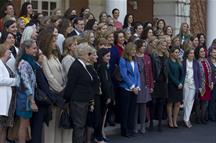International Women's Day
Mariano Rajoy advocates a "great national pact on work-life balance and shared responsibility"
President's News - 2017.3.8
1. Images of the act | Pool Moncloa / Marcos Martín y Jorge Villar - 2017.3.8
Moncloa Palace, Madrid
The President of the Government argued, before representatives of the Spanish Federation of Female Directors, Executives and Professionals (Spanish acronym: FEDEPE), that "working for women means working for Spain, because Spain must compete for talent and talent is your main asset". He stated these words at an event to commemorate International Women's Day held at Moncloa Palace, which was also attended by the Ministers for Employment and Social Security, Fátima Bañez, and for Health, Social Services and Equality, Dolors Montserrat.
 Pool Moncloa/Diego CrespoAfter recalling all the victims of gender-based violence and those women who still suffer "the worst and most unbearable manifestation of inequality", to whom he dedicated his opening lines, Mariano Rajoy pointed out that there are still barriers in the path of the professional development of women, including work-life balance. Although measures have been set in motion, among which he quoted the extension of paternity leave, the possibility of reducing the working day for parents of children under the age of 12 and that leave when child is breast-feeding can be taken by both parents, there is still a lot to be done. To that end, he advocated reaching "a great national pact on work-life balance and shared responsibility", and also because "there are an increasing number of men who defend their rights to be with their children".
Pool Moncloa/Diego CrespoAfter recalling all the victims of gender-based violence and those women who still suffer "the worst and most unbearable manifestation of inequality", to whom he dedicated his opening lines, Mariano Rajoy pointed out that there are still barriers in the path of the professional development of women, including work-life balance. Although measures have been set in motion, among which he quoted the extension of paternity leave, the possibility of reducing the working day for parents of children under the age of 12 and that leave when child is breast-feeding can be taken by both parents, there is still a lot to be done. To that end, he advocated reaching "a great national pact on work-life balance and shared responsibility", and also because "there are an increasing number of men who defend their rights to be with their children".
A 50-50 planet
Mariano Rajoy recalled the challenge set by the UN to achieve a 50-50 planet by 2030, in which gender gaps on such matters as employment and education will have disappeared and he expressed his confidence that this challenge will have been achieved in Spain "some time before that". To that end, he pointed to the need to close "all the gaps, which are not only an injustice, but also provide a competitive disadvantage", and asserted that "the challenge is real equality" between men and women, a path down which Spain is taking "steps in the right direction".
In this regard, he reiterated what he had said a couple of hours earlier in the Lower House of Parliament, that "there has never before been an 8 March with so many women in work". In his opinion, this fact is fundamental for making progress since "equality begins with employment". In Spain in 1987, 33% of women were in work, while today this figure has risen by 20 points, he recalled.
While Spain contributed seven out of every ten new unemployed women in Europe during the crisis, in the last year more than half of the women who have left the unemployment queues in Europe have been Spanish.
Improvements in equality
 Pool Moncloa/Diego CrespoMariano Rajoy also reviewed other figures that show an improvement in equality. 55% of university students are women, which helps correct the education gap. Furthermore, since 2011, two out of every three new entrepreneurs are women and over the last decade the number of female board members of IBEX 35 companies has increased four-fold.
Pool Moncloa/Diego CrespoMariano Rajoy also reviewed other figures that show an improvement in equality. 55% of university students are women, which helps correct the education gap. Furthermore, since 2011, two out of every three new entrepreneurs are women and over the last decade the number of female board members of IBEX 35 companies has increased four-fold.
In terms of the wage gap, this has fallen by four points and there are now 180,000 women with children who have received the wage supplement in their pension pushed through by the government, which has helped reduce the imbalance in pensions between men and women by more than 11%.
To end, the President of the Government sent out a message of optimism and underlined that "the future of Spain depends" on achieving real equality. This will also lead to "a fairer nation", he said.





